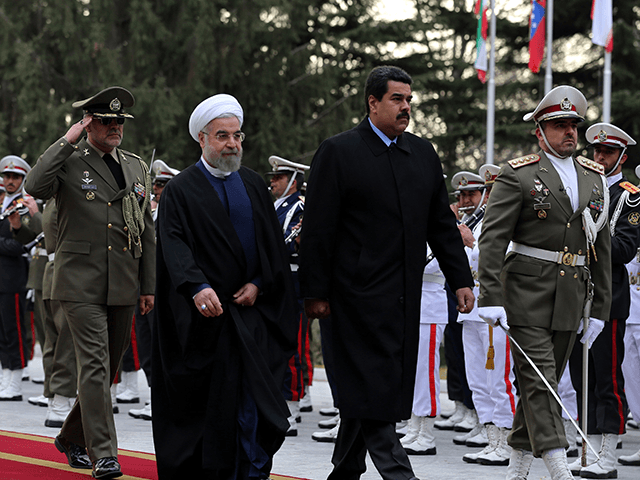Iran’s state-owned National Iranian Oil Refining and Distribution Company (NIORDC) will soon begin to revamp Venezuela’s largest refining complex to restore its lost crude distillation capacity after years of socialist mismanagement, according to a report published by Reuters on Monday.
The Reuters report cited four sources close to the plan, who claimed that the project involves a 100-day revamp of the Paraguaná Refining Center, located in the nation’s eponymous peninsula. In addition to boosting the center’s fuel output, the revamp also seeks to bring the socialist regime closer to ending its reliance on U.S. refinery technology.
#Iran working with #Venezuela to revamp their Paraguana #oil refinery, one of the world's biggest#oott #ongt https://t.co/pdlAGOET75
— Christian Schmollinger (@ChristianSchX74) February 6, 2023
The Paraguaná Refining Center is the world’s second-largest refinery. Prior to the collapse of Venezuela’s socialist regime and its mismanagement of the nation’s oil industry, the center was capable of refining 955,000 barrels of oil per day. Reuters’ report states that the complex is currently operating at a quarter of its capacity.
NIORDC and Venezuelan state-owned oil company Petróleos de Venezuela (PDVSA) are expected to sign a 460 million Euro contract ($492 million) in the coming weeks to begin the renovation project, which will place Iran in charge of procuring the parts, their installation, and subsequent inspection before returning control of the refinery to PDVSA.
According to Reuters, the overhaul will use Chinese and Iranian parts despite the fact that the facility originally used American technology — a feat that, according to one of the sources cited, will “not be easy” but, if successful, could open the way for a “larger overhaul” between 2024 and 2025. The revamp also aims to repair the complex’s dilapidated power supply; the Paraguaná refining complex is located in Venezuela’s Falcon state, one of the regions most affected by frequent power blackouts that can last up to three days.
The report comes days after Iran’s foreign Minister Hossein Amir-Abdollahian arrived at Caracas on early Friday morning after visiting Nicaragua and Cuba to meet with socialist dictator Nicolás Maduro, Venezuelan Oil Minister Tareck El Aissami, and other members of the socialist regime.
During their encounter, Amir-Abdollahian and Maduro discussed the need for emphasizing “the strengthening and monitoring of projects and accelerating their implementation, as well as vigilance in defending their national interests against external pressures.”
Maduro described the meeting with the Iranian foreign minister as “productive” on his Twitter account. The socialist dictator wrote, “the great Venezuela-Iran alliance will continue to consolidate in order to build greater well-being, development and solidarity between both brotherly peoples.”
La gran alianza Venezuela – Irán seguirá consolidándose para construir mayor bienestar, desarrollo y solidaridad entre ambos pueblos hermanos. ¡Avancemos en la integración y el crecimiento! pic.twitter.com/VS1LDzol4w
— Nicolás Maduro (@NicolasMaduro) February 4, 2023
“Let’s move forward in integration and growth,” Maduro concluded.
Much like its other ideological allies — such as China, Russia, and Turkey — Iran has been instrumental in providing Venezuela’s rogue socialist regime with a lifeline and technical assistance that have helped keep the authoritarian regime afloat — at the cost of a growing influence of the Islamic regime in the region.
Venezuela, the country with the world’s largest proven oil reserves, has faced severe oil shortages that worsened during 2020 and were eased with the arrival of Iranian oil. In that same year, the Maduro regime also handed over control of a supermarket chain it had seized out of Colombian private hands to an Iranian group with ties to the Islamic Revolutionary Guard Corps, a U.S.-designated terrorist organization.
In May 2022, Iran signed a 110-million-Euro (about $107 million at the time) deal with the Maduro regime to have Iran repair Venezuela’s El Palito refinery after the socialist regime failed to successfully reactivate the plant on several occasions. One of their failed efforts caused a severe oil spill that gravely damaged one of the nation’s most emblematic national parks.
The repairs of El Palito refinery concluded in October and the Islamic regime has been refining upwards of 100,000 barrels of its own oil in the now-repaired refinery since.
The Islamic regime and the Maduro regime signed a 20-year cooperation agreement in June, covering fields such as oil, politics, economy, and petrochemicals. In July, Iranian deputy interior minister for economic affairs Mohsen Kousheshtabar announced that the Maduro regime had ceded one million hectares of Venezuelan farmland to the Islamic regime for the cultivation of and growing of food.
With Venezuela’s oil industry left in a near-ruined state after years of socialist mismanagement, the Maduro regime has struggled to recover Venezuela’s lost oil production capacity — which by 2020 had dramatically sunk to its lowest level in 75 years. Although the Maduro regime failed to attain the two-million-barrel-per-day output it promised OPEC in 2022, it managed to boost its oil production from 553,000 barrels per day in 2021 to 685,000 barrels per day in 2022.
After the Biden administration provided the Maduro regime with oil sanctions relief that allow Chevron to produce and export oil, the California-based company announced in January that it had increased its oil output from 40,000 to 90,000 barrels per day, hoping to reach upwards of 200,000 barrels per day by 2024.
The Amuay refinery — which, along the Cardon and the Bajo Grande plants, comprise the entire Paraguaná Refining Center — had to recently suspend operations for eight weeks through January after the failure of the plant’s catalytic cracker, essential machinery to produce gasoline, causing gasoline shortages throughout the country.
El Fantasma de las colas de gasolina vuelve a Maracaibo este sábado: Largas filas se registran fuera de las bombas https://t.co/FCdWvs7vN0 a través de @esconusted_ pic.twitter.com/6yFymt6g2a
— esconusted (@esconusted_) December 11, 2022
Christian K. Caruzo is a Venezuelan writer and documents life under socialism. You can follow him on Twitter here.

COMMENTS
Please let us know if you're having issues with commenting.